This post is part of a larger deep dive
Curious about the role of the illusion of time in The Persistence of Memory? Check out The Persistence of Memory Explained!
Or read the full The Persistence of Memory article!
This post is part of a larger deep dive
Curious about the role of the illusion of time in The Persistence of Memory? Check out The Persistence of Memory Explained!
Or read the full The Persistence of Memory article!

Our daily experiences certainly give us the impression that time is flowing. Nobody really questions that the past is what has already happened, the present is what is happening at this precise moment and the future is what it still has to happen.
This simple and straightforward description of time is intuitive, and most of you will say even self-evident. Time is a given, no reason to complicate matters.
Well, a few philosophers, physicists and neuroscientists will disagree with this definition of time. In fact, some will even tell you that time is nothing but an illusion.
That’s not me saying it.
Albert Einstein wrote to one of his friends:
“The past, present and future are only illusions, even if stubborn ones”.
Albert Einstein
To understand what Einstein meant by it, let’s take a closer look at what we mean by time.
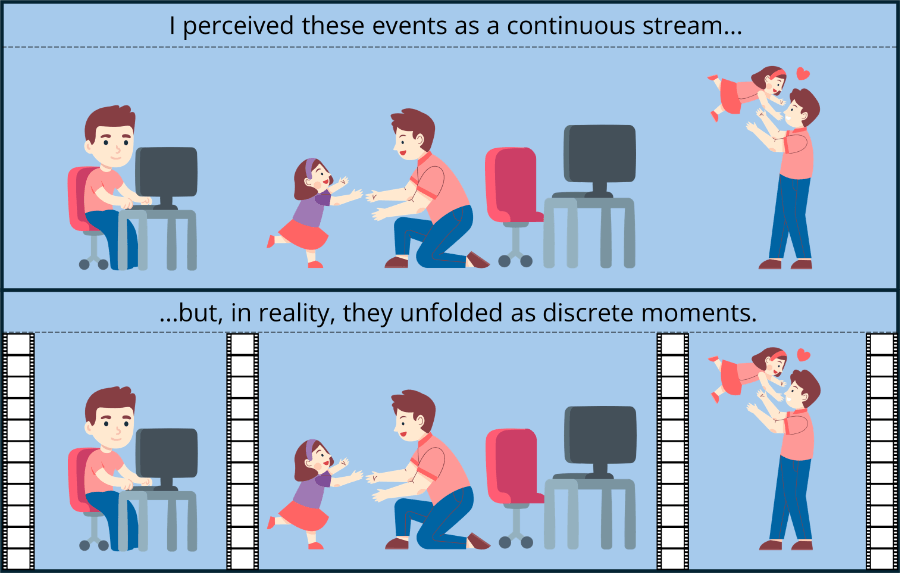
Before tackling the issue of why time may be an illusion, consider this event I just experienced.
I was sitting on my desk writing this article up, when I heard my youngest daughter calling my name and running towards me. I turned around, saw her and picked her up, and now we are playing together.
To me, these sequence of events, from writing the article on my computer to playing with my daughter, unfolded very smoothly in my mind, and I didn’t question that time flowed from one to the next event as a continuous stream.
However, is my perception of time flowing accurate? Well, some may argue that those events are actually discrete, each happening at a specific location in space and at a particular moment in time.
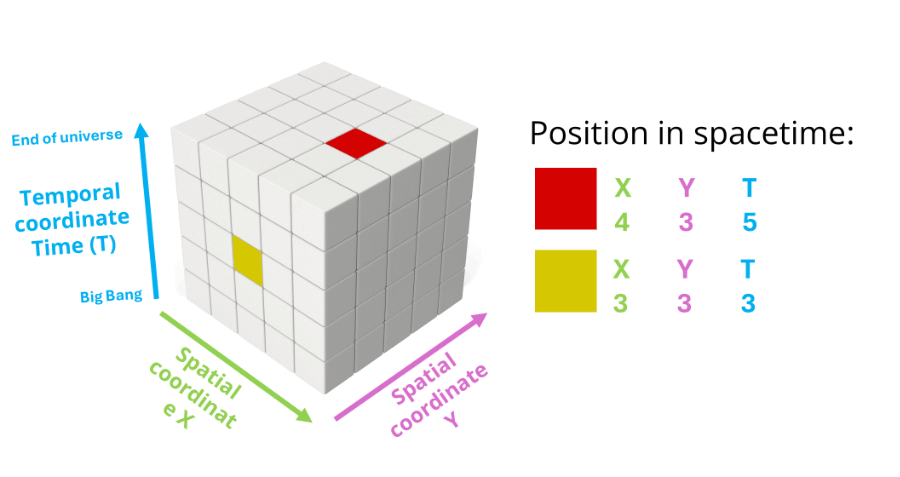
You may have heard that our universe is four-dimensional. That is because in order to specify an event we need to know the three coordinates of space, as well as the coordinate of time.
So, we can think of the universe as being the complete set of all events (i.e., every point in space at every moment in time), what some scientists call the Block universe (see below).
Thinking of the universe as consisting of four-dimensional space highlights the point that these different event “configurations” do not happen simultaneously. We experience one configuration (e.g., me working on the computer), and then another (e.g., me hearing my daughter calling my name), and another (e.g., me directing my attention to my daughter), and so forth.

A good analogy to how the world exists is like the different frames of a film reel. A film is nothing more than discrete frames put together in a specified sequence. We see each frame separately, but our brains seamlessly connect these frames, creating the illusion of a smooth, continuous motion rather than a series of discrete, static images. But, just as this continuity is an illusion created by our brains, so is our perception of time.
But, if the flow of time is an illusion, how are we able to distinguish past from future? Clearly, we experience something that has happened to be the past, and we cannot really see the future, so…?
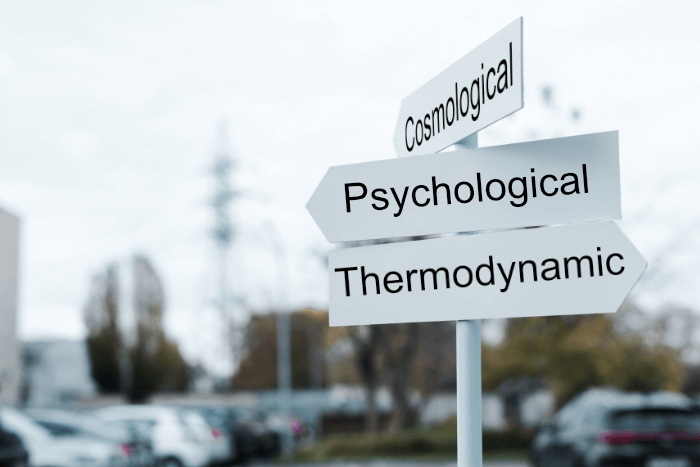
The answer to the question why we perceive time passing, is due to something called an “arrow of time”. Physicists more or less agree that there are at least three arrows of time, which, in combination, gives us the feeling of time flowing. So let’s take a look at them in turn.
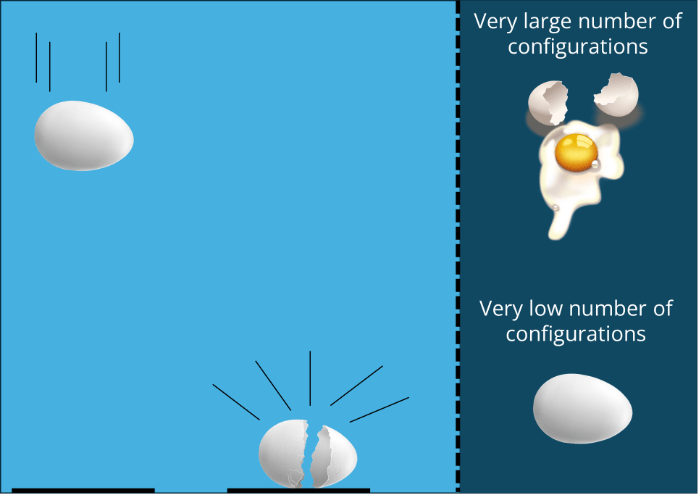
If you drop an egg on the floor, there is only one result: the egg breaks. Have you ever experienced the reverse process, in which a broken egg spontaneously becomes intact? I’m sure you haven’t, and the reason you haven’t is because of something called the second law of thermodynamics.
This mouthful of a law states that, in an isolated system, disorder will tend to increase over time. Physicists call this disorder, entropy, and it simply means that the energy and particles of a system (e.g., the egg) are more disordered and spread out.
Why is entropy (disorder) larger in a broken egg than an intact one? It all has to do with probability.
After breaking, there are way more possible configurations of broken egg shells on the floor, than there are configurations in which the egg parts recombine into an intact egg. In a way, “higher entropy” is sort of equivalent to “higher probability”.
So, for natural processes such as eggs falling to the ground, entropy always increases, and unless you inject a good amount of energy, they won’t become more ordered spontaneously.
In summary, the thermodynamic arrow of time is simply the direction of time in which entropy increases.
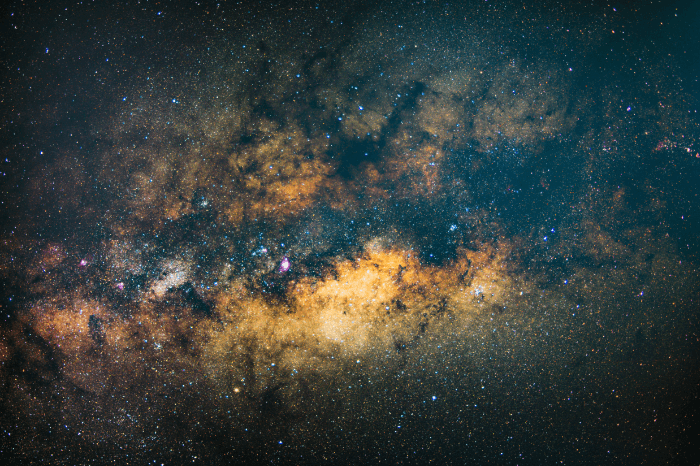
It is now widely accepted that the universe is expanding away from the Big Bang. Indeed, ever since the Big Bang, galaxies have been moving away from each other, and the universe is becoming more spread out.
This “spreading out” causes entropy to increase, because energy becomes less concentrated, less organised, and more dispersed over a larger space.
So, the cosmological arrow of time is simply the direction of time in which the universe expands.

The psychological arrow of time is what gives us the perception of time flowing.
The reason you perceive time as flowing forward – from past, towards the future – is because you form memories of the past.
For example, I’m typing this text right now, but I remember that a few seconds ago I just sipped a cuppa. Because I remember drinking tea, I know this has happened in my past relative to the present moment. So, our perception of time flowing is directly related to our past memories.
Also, you cannot really remember the future. We might conceive the future by imagining it in the present, but we can never experience a future event.
So, the psychological arrow of time is simply the direction of time in which we remember the past but not the future.
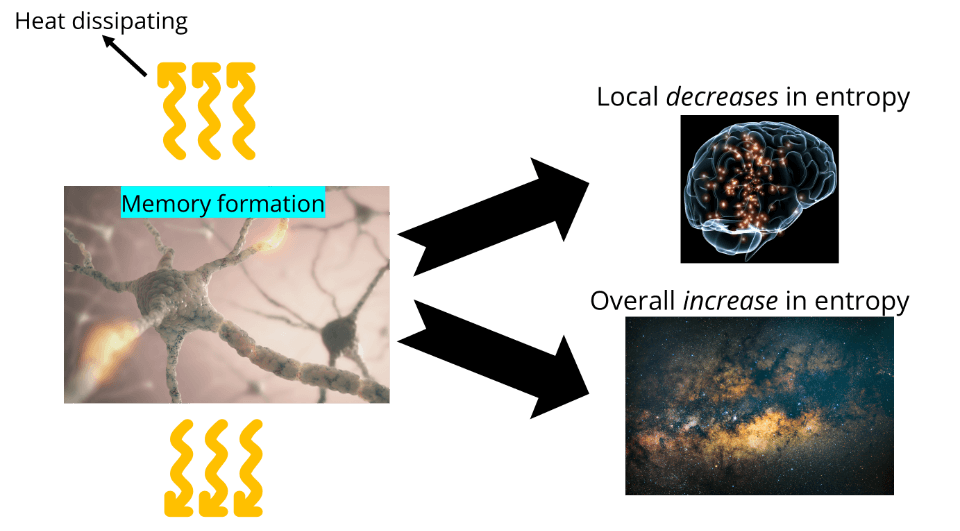
Memories are, of course, created by the brain. Neurons fire in synchrony, more synapses are formed, brain regions communicate more efficiently. All of these phenomena are contributing to the formation of memories.
But… hang on a minute! I just told you that time flows in the direction of higher entropy.
However, memory formation doesn’t sound like entropy is increasing, does it?
If anything, memory formation should entail the exact opposite, i.e. entropy decreasing. After all, it would seem that memories are more ordered types of information than random neuronal firing.
Right. The problem is that forming a memory requires energy, and while much of that energy is used to organise neural connections, some is inevitably lost as heat. This heat dissipates into the surroundings, contributing to an overall increase in entropy in the universe.
Critically, the increase in entropy due to heat dissipation is greater than the decrease in local entropy of the memory (see figure above).
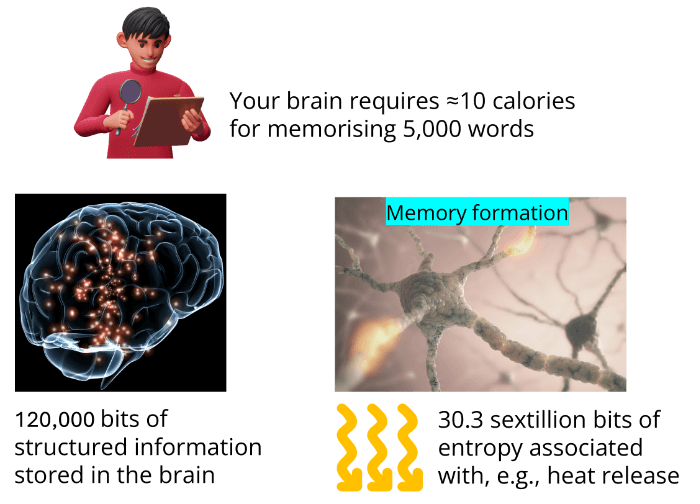
Let’s have an example to give all of this a bit of context.
Say that you are reading this article and have managed to memorize every single word of it. There are about 5,000 words, so that will be equivalent to 120,000 bits of information. This means the order in your brain has increased by about 120,000 units.
That might sound like a lot until you consider that the neurons involved in forming this memory required about 10 calories of energy, which corresponds to around 30,300,000,000,000,000,000,000 bits of potential energy. However, only a small fraction of this energy is used to encode the memory, while the vast majority is dissipated as heat, contributing to the overall increase in entropy in the universe. That’s an unimaginably vast amount of entropy compared to the tiny fraction of order created in your brain to store this memory.
Still, you might argue that the dissipated heat energy might still be reused and turned into ordered energy somewhere, right? So if we capture and recycle all the lost heat energy, we could potentially stop entropy to increase.
Well, the problem is that energy released as heat gradually loses its ability to do work. As heat energy spreads out, the temperature difference is insufficient to exploit heat energy to perform useful work. You could argue, that maybe we can harness that waste energy into useful energy. But, again, you would require to run additional machinery, which would itself generate more useless energy.
There is a sobering conclusion to this, dear readers: the universe is in an inevitable motion towards total entropy. It doesn’t matter how much work you place to keep things in order. That work requires energy, and the amount of heat released will always exceed the increase in local order.
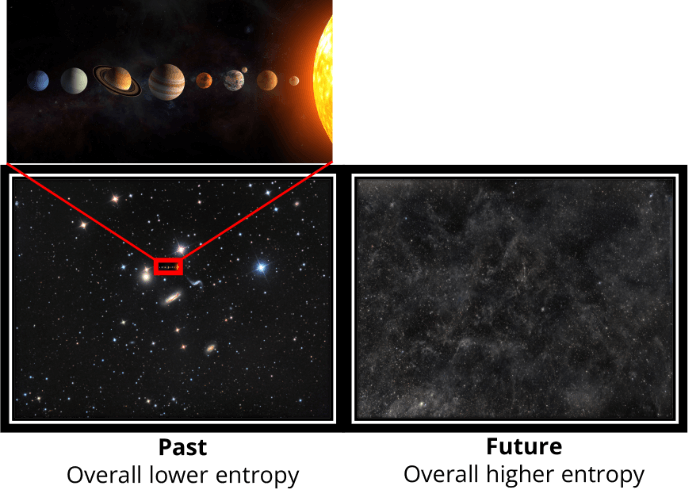
Within a Block universe interpretation of time, past, present and future are equally real – these are not illusions. The thermodynamic arrow of time provides an objective framework for understanding the unidirectional flow of time. If you tracked the overall amount of entropy at a particular moment in time and the next one, you could determine which of these two events is past and which is future, relative to one another. At the scale of the universe, past is always associated with lower entropy and future is always associated with higher entropy.
However, we are surrounded by local decreases in entropy. For example, ice forming when water is exposed to cold; clouds forming in the sky; objects created by humans; etc.
Crucially, we don’t experience time moving backwards whenever we encounter such local decreases in entropy. But why not? If increased entropy signals time moving forward, shouldn’t decrease entropy signal time moving backwards?
Well, the reason why we don’t experience time moving backwards is due to cause-effect relationships. In our universe, causes always precede effects, and this awareness gives us a sense of time moving forward. So, even though we cannot feel entropy increasing at the scale of the universe, we associate higher entropic events to effects under normal circumstances, for example, if an egg falls (cause) it will break (effect).
If we witness local decreases in our environment (e.g., ice forming; the effect), we still know they are due to some external inputs of energy (e.g., the weather is very cold; the cause).

In order to experience flow, there must be an experience in the past that merges into an experience of the present which itself merges into an experience of the future. That is literally the definition of flow “something moving into something else in a steady stream”.
Explaining an experience in the present is easy. It is literally every second of your conscious life – when you are conscious, you are experiencing the present.
You might think that an experience in the past is also easily describable, since you have memories of your past (what you were just doing a second ago, that delicious meal you ate yesterday, or the memory of having hurt your knee on your first bike ride).
The issue is that you are invoking past memories as they are being experienced right now. In fact, I’m sure there wasn’t a single time in which you have recalled memories that weren’t done in the present.
Similarly, even though you can anticipate future events with a high degree of accuracy, you can never really experience a future event as is.
Alas, the past and the future aren’t really experienced in the past and in the future, respectively, they are only experienced in the present. If so, we cannot really say that we are experiencing the flow of time, because there is no flow from past into the present into future; we are only experiencing present moments.
This is the reason why you might hear that the perception of the passage of time is only an illusion. It’s an illusion, because there is no way you can experience moving from past to present into the future. There are only snapshots of present moments.

The conclusion many scholars have reached is that perhaps the universe already contains all moments, both past, present and future laid out. According to this theory, the Block universe theory, time is simply an extra dimension, pretty much like the 3 spatial dimensions.
You might rightfully wonder that if past, present and future events are already delineated in this block universe, why can’t we remember the future then? Why can’t we jump to some past event, like we can jump to a specific spatial coordinate?
The answer is in how our brains work. Humans evolved to experience events in, and recall past events from, the present. Evolution didn’t deem it necessary that we access the future.
Could a being potentially exist that would have access to all of the Block? Theoretically, there is no reason why not. This being would essentially be able to “see” all past, present and future events simultaneously, even though it would probably not be able to change any of them.
So, we cannot “remember” the future because our brains have evolved to process time linearly. However, according to the Block universe, the time-scape is all there – past, present and future.
Masterpiece
I must say you are the most creative reviewer of film and art I have read, I never would have connected Dali’s painting with the Second Law of Thermodynamics. Good Job!
To be honest, I realized that the painting had something to do with time, and I sensed the message also had something to do with dying, but I would not have been cleaver enough to bring in entropy. Nonetheless, your explanation does make sense.
Hi David,
Wow, many thanks for the compliment!
To be fair though, the ideas I put forth in my articles have been, in some form or another, already touched upon out there. I simply expand on these ideas and maybe add a slight personal touch 😉
But, really, many thanks for the comment – it’s comments like yours that give me the motivation to keep writing articles like these 😀